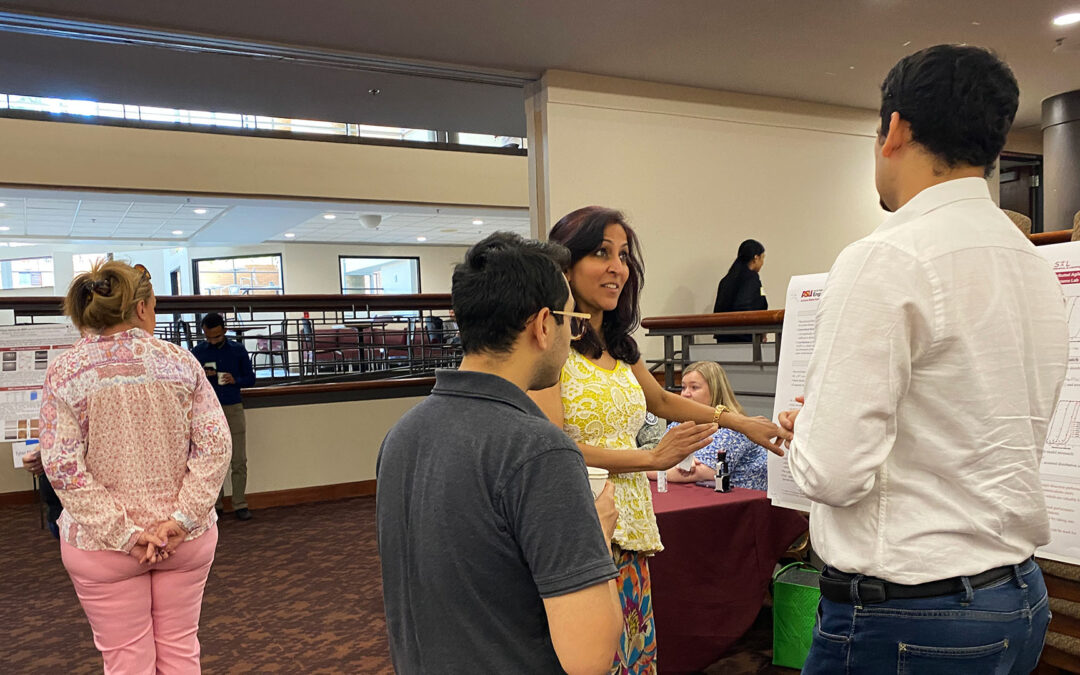Lalitha Sankar noticed a pattern at several peer and top-ranked electrical and computer engineering departments: Opportunities abound for graduate students to highlight their research and attract broader interest, including from local industry partners, when the schools host annual events open to the public showcasing student research.
Sankar, a professor of electrical engineering in the Ira A. Fulton Schools of Engineering at Arizona State University, noticed that such events help students hone their presentation skills and expand their professional networks.
She spearheaded the creation of the ECEE Graduate Award Committee to honor high-achieving graduate students within the School of Electrical, Computer and Energy Engineering, or ECEE, part of the Fulton Schools. Faculty members nominate their students excelling in research and academic achievements for four awards in various electrical engineering research areas and one award for an exceptional master’s degree student.
Awardees are chosen from the nominees by a judging committee of Fulton Schools faculty members after ECEE Graduate Research Day, a poster presentation session where the judges and other attendees view the students’ work and discuss it with them. The 2024 event was the first of its kind.
“It’s a phenomenal way to showcase the diverse and well-funded research we do in this school,” Sankar says. “We’re one of the top schools within FSE for funding, and our faculty are experts in a variety of facets of electrical engineering.”
She says it is encouraging to see so many electrical engineering faculty members nominate their students and even more volunteer as judges, giving an opportunity for research groups who might not otherwise talk to each other to interact.
“The best part is that the students get to talk to other faculty members besides their own advisors,” Sankar says. “They may even get to know what other faculty do, and best yet, be challenged in their thought processes when questioned by other researchers. It is very easy for most of us, including students, to live in our own silos.”
She hopes that those who attend ECEE Graduate Research Day will remember their time at ASU more fondly and remain more engaged with the university community after graduation.
Anamitra Pal, a Fulton Schools associate professor of electrical engineering and part of the awards committee, joined the effort to increase recognition of high-achieving graduate students’ research work. Pal contributed to the creation of the judging rubric and was actively involved in making many suggestions to enhance the end-to-end review process.
He says that in addition to students learning about their peers’ and faculty members’ research, the event provides an opportunity for faculty members to expand their knowledge of what electrical engineering areas related to their own entail.
“I work in the area of power systems, but I get to interact with students who work with power electronics,” Pal says. “I think ECEE Graduate Research Day is one of the best ways for me to learn more about the latest research that ASU students in power electronics are doing, beyond my limited interaction with them in my own research.”
Other members of the awards committee included Fulton Schools faculty members Suren Jayasuriya, an assistant professor of electrical engineering with a joint appointment in ASU’s School of Arts, Media and Engineering; Saeed Zeinolabedinzadeh, an assistant professor of electrical engineering; and Yu Yao, an associate professor of electrical engineering. All of them worked closely to develop a consistent strategy across all sub-areas of ECEE to evaluate nominations and assign judges.
“This event wouldn’t have been possible without each and every committee member’s efforts,” Sankar says.
Fulton Schools electrical engineering doctoral student Brent Wallace also found the event a beneficial opportunity to exchange research ideas with others he doesn’t work with.
Wallace’s research focuses on control systems that are essential to keep complex electrical systems functioning properly. Examples include ensuring a car’s cruise control stays as accurate as possible to the speed it’s set to, or ensuring an airplane’s autopilot mode safely maintains the proper speed and direction to keep the plane from crashing.
He aims to optimize control system algorithms for reinforcement learning, a type of machine learning methodology that continually trains a system using data to improve its performance over time. His research’s ultimate purpose is to ensure control systems work as accurately as possible, improving precision and functionality of existing algorithms that may lead to erroneous decisions. Such errors can result in consequences as severe as a plane crash due to autopilot malfunction.
“I’m hoping to convey my ideas to people who don’t have as much familiarity with my field,” Wallace says. “My goal being here is to educate folks and to learn new things about problems that I don’t work on.”
With the 2024 event finished, winners for each award category are expected to be announced later in April or May once judges’ scores are finalized. The organizing committee is also thinking about how to improve future annual ECEE Graduate Research Days.
Plans include making the event bigger to include judges invited from industry and other universities around the country, showcasing ASU graduate students’ electrical engineering research to a larger audience. The organizing committee would also like to increase Fulton Schools electrical engineering faculty involvement in the events and ECEE Graduate Award Committee.
Sankar sees plans to grow the event in the future as a way to ensure graduate students feel valued for their contributions to the Fulton Schools.
“We are very well-ranked and a very strong school for electrical engineering research and teaching,” Sankar says. “No research happens without our graduate students. Every way to give them opportunities for networking and presenting their work benefits us in the long term. On a more collegial level, seeing many of our faculty and graduate program support staff members in the same room present to encourage and enable our students’ efforts and successes is an event worth repeating.”
